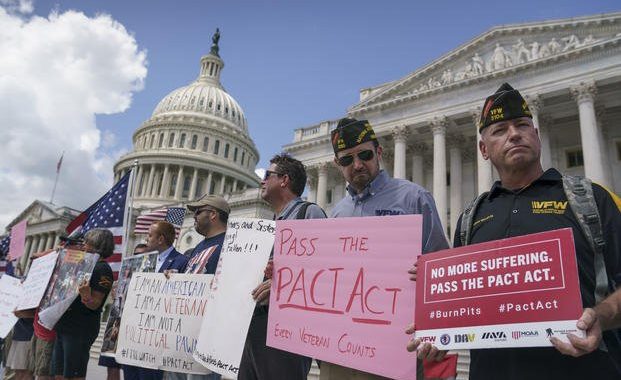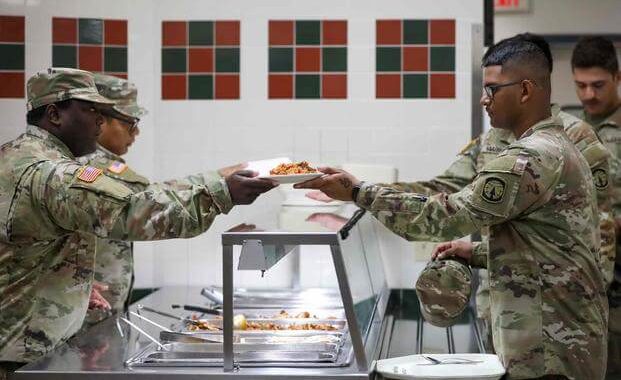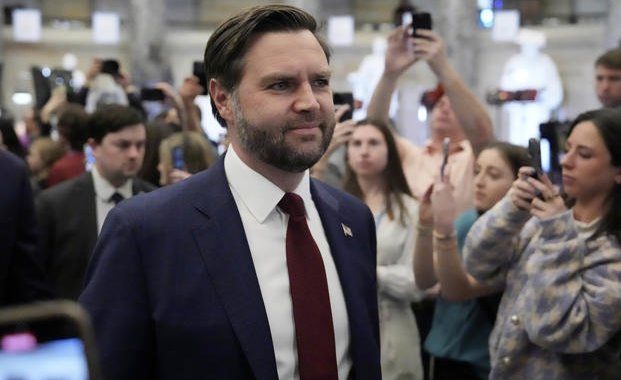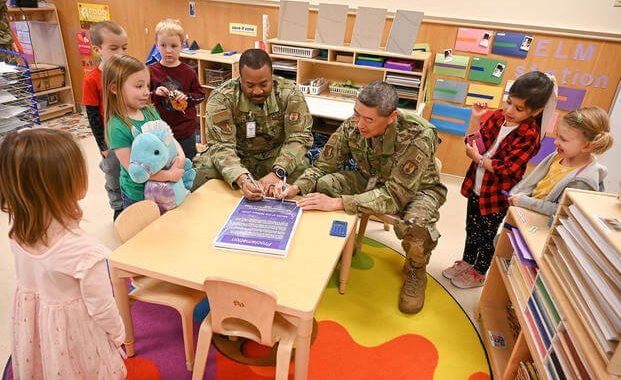Military leader, astronaut from Anne Arundel inducted into Maryland Women’s Hall of Fame
7 min read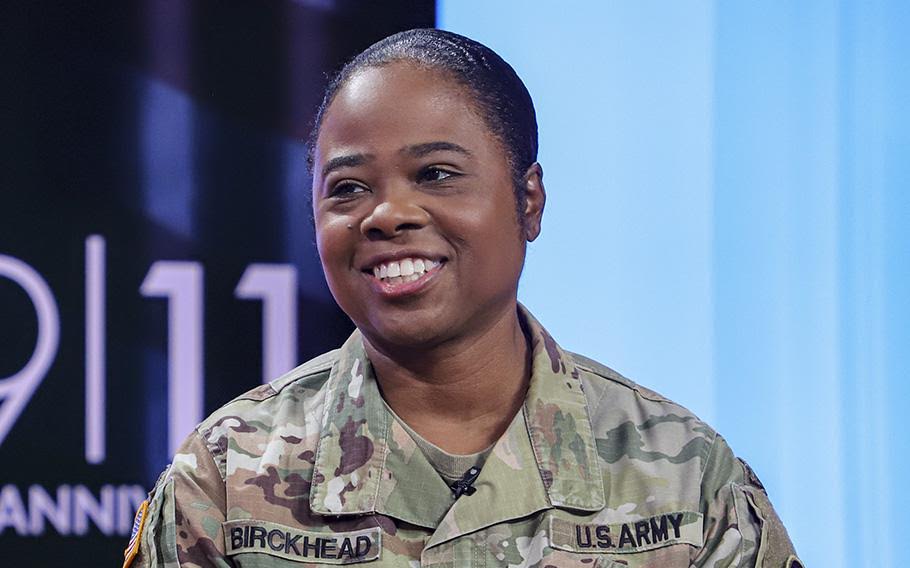
Brig. Gen. Janeen Birckhead, commander of the Maryland Army National Guard, answers questions during an interview in Baltimore, Md.
ANNAPOLIS, Md. — Brigadier General Janeen Birckhead, commander of the Maryland Army National Guard, was inducted this month into the Maryland Women’s Hall of Fame, the second Anne Arundel County resident to receive the honor in the past two years.
Birckhead was among five Maryland women inducted this year. Last year, scientist Mary Cleave, a former astronaut and the 10th American woman in space,, received the honor. Both women live in the Annapolis area.
Annual inductions were held in March during Women’s History Month. The other four 2023 inductees were Charlotte M. Cooksey, a retired District Court judge in Baltimore; Ana Sol Gutierrez, former Montgomery County board of education member, state delegate and the first Latina elected to public office in Maryland; Gloria Lawlah, a former civil servant and state legislator from Prince George’s County and Edith “Jackie” Ronne, a polar explorer and the first female member of an Antarctic expedition, whose family lived in Maryland for generations.
Birckhead and Cleave say they were proud to be inducted, in part, because of the highly accomplished women inducted before them.
Judith Vaughan-Prather, executive director of the Maryland Commission for Women, which manages the Maryland Women’s Hall of Fame, said the inductees range from former slaves to artists, scientists and social servants.
Some of the hall’s more famous inductees include conservationist Rachel Carson and American Red Cross founder Clara Barton. Others are women of lower profile who deserved greater recognition, Vaughan-Prather said, which is why the hall matters.
“[Women’s] stories are often hidden or forgotten,” she said. “Women and young women need role models. We need to be able to see that women can do these things and, in fact, have done these things.”
Janeen Birckhead
Originally from Snow Hill, Maryland on the Eastern Shore, Birckhead, who was inducted March 16, got involved in the military when her mother encouraged her to apply for a Reserve Officers’ Training Corps college scholarship.
“I had a cousin who went to the Air Force Academy, a year older than me,” Birckhead said. “[My mom is] thinking, ‘This is great. You should give this a try, Janeen,’ and I thought ‘No, mommy. I don’t want to go in the Army.’”
So her mother enticed her, telling her it would be a challenge, which spoke to Birckhead’s competitive spirit.
“’I said OK, Mommy, I’ll give it a try,’” she said.
She got the scholarship and enrolled at Hampton University, a historically Black university in Virginia. After graduating in 1991, Birckhead worked on Capitol Hill for the late U.S. Sen. Paul Sarbanes from Maryland. Sarbanes, who was succeeded by current Sen. Ben Cardin, was the father of U.S. Rep. John Sarbanes, who represents parts of Anne Arundel County including Annapolis.
After her time in Washington, Birckhead became a state equal employment manager for the Maryland National Guard before taking a position at the U.S. Department of Defense as an agent and then a special agent in charge with the Defense Security Service. Birckhead pursued careers both as a member of the military and as a civilian throughout her career.
As Birckhead progressed through both careers, she played key roles in historic moments in both Maryland and Washington. She led the state’s National Guard troops, as well as thousands of others from across the country, in response to the attack on the U.S. Capitol on Jan. 6, 2021, where she said Maryland had the first National Guard on the ground in support. She was also appointed by former Gov. Larry Hogan to lead the Maryland Vaccine Equity Task Force during the COVID-19 pandemic.
Watching her guard troops work with others from around the country on Jan. 6 instilled pride in Birckhead.
“That’s what the Army and what being in the National Guard prepares you to do, to come together as professionals and be able to respond,” Birckhead said. “You saw it there. You see it in the National Guard whether it’s floods or fires or whether it’s going overseas; we are always ready, always there.”
In 1995, Birckhead moved to the Annapolis area and raised a daughter and son, both now in college.
Birckhead is now commander of the Maryland Army National Guard and serves as the deputy commandant for reserve affairs at the U.S. Army War College.
Her career has inspired young military women, she’s discovered, one of whom recently asked Birckhead to partake in her pinning ceremony promotion from Army major to lieutenant colonel.
It’s important for young women to see other women recognized for their achievements, Birckhead said. That’s how they know about all the career possibilities out there for them, adding she encourages young women to connect with more accomplished female counterparts.
“’Are they still living? Can I reach out to them and give them their flowers while they are alive? Can I tell them what an inspiration to me they are while they are alive? I think that is important,” she said.
Mary Cleave
Cleave, 76, was one of five Maryland women selected in 2022. In addition to being one of the first American women in space, she helped develop and lead projects to gather critical information about the effects of climate change.
Always fascinated by airplanes, Cleave started flying lessons as a 14-year-old growing up on Long Island, New York which she funded with her babysitting money.
“I couldn’t understand why my mother didn’t want to be my first passenger,” Cleave said. “When I got in the car with my nephew [who was learning to drive] I understood.”
While Cleave had a strong interest in aviation, she applied to veterinarian school at Cornell University but was not accepted.
“They used to discriminate based on gender at all the professional schools — vet school, law school, medical school. When Title IX went through, they had to stop that,” Cleave said. “It made a huge difference.”
She was accepted to Colorado State University’s pre-vet program, but when it came time to apply for vet school she ran into the same roadblock; the programs didn’t accept women. She switched her focus to botany.
After Cleave obtained her bachelor’s degree in biological sciences at Colorado State, and her master’s degree from Utah State University, the school’s dean of the College of Engineering asked her to consider a doctorate in engineering. With Title IX law, there was a new world of options for Cleave to explore.
“It was the best thing that ever happened to me,” Cleave said, adding that the dean told her she needed to be an engineer because she was “too damn impatient to be a good scientist.”
Partway through her doctorate, a colleague told her about an advertisement at the local post office. For the first time, NASA was recruiting women, people of color and nonmilitary personnel for the astronaut class of 1978. It was a dream job for Cleave — flying and science together.
NASA representatives told Cleave they wanted her to complete her doctorate first, which she did before joining the next astronaut class in 1980. The decision meant she missed out on joining the country’s first co-ed astronaut class and the chance to become the first American woman in space, a title held by Sally Ride, but she was glad she finished her degree.
Cleave took her first space shuttle flight in 1985, Cleave became the 10th woman in space. On and her second flight in 1989, when her team deployed the Magellan spacecraft on its journey to Venus.
Cleave took her first flight aboard the space shuttle in 1985, becoming the 10th American woman in space. On her second flight in 1989, her team deployed the Magellan spacecraft on its journey to Venus.
Between her two flights, the Challenger disaster had occurred and Cleave went to work on crew equipment issues following the mission. On her second shuttle flight, as she looked down on the Amazon rainforest, she had a realization that she wanted to return to environmental research.
“Looking at the Earth, particularly the Amazon rainforest, the amount of deforestation I could see, just in the five years between my two space flights down there, scared the hell out of me,” Cleave said.
In 1991, Cleave moved to Annapolis to be closer to her aging parents, which led her to NASA’s Goddard Space Flight Center, home of the agency’s environmental spacecraft programs.
At Goddard, Cleave managed a project to measure all the phytoplankton in the ocean via spacecraft, developing models to understand carbon dioxide building up in the atmosphere.
“You need good data to fill in those models,” Cleave said. “This was a big missing piece of the puzzle.”
Cleave went on to do other work gathering data from space to help scientists better understand climate change. She also briefly worked on redesigning the proposal for the International Space Station after which she was asked to work at NASA headquarters in Washington.
“Somebody has to go over to the Hill and explain to those guys why it’s important to put their money in this,” Cleave said.
She retired from NASA in 2007 and has been enjoying all Annapolis has to offer, especially sun rises over the Chesapeake Bay. She joined the Annapolis Rowing Club, which helped her address bone density loss suffered while spending time in space. She also began volunteering d with the Anne Arundel County League of Women Voters and now belongs to the Anne Arundel County Bird Club. She also mentors students through the Astronaut Scholarship Foundation.
“I really spend time hoping I’ll have an impact on the young ladies,” Cleave said.


